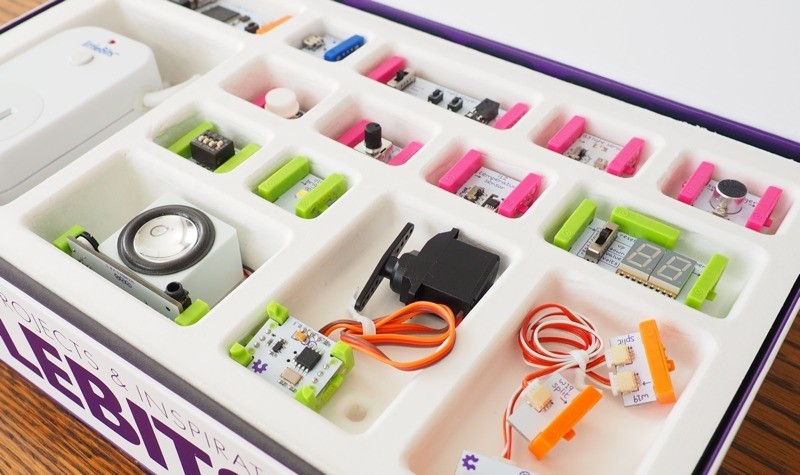LittleBits may be in a marketing limbo: are they marketing for kids, or for ready-to-tinker adults?
This would be a good way for me to get into "apps" to control things. I am older - old enough to have built those Radio Shack kits as a kid. I am great with hardware - I can build my own computer and do repairs and upgrades, and I am self-taught in this; but in programming, I know very little.
I also do not know robotics - the closest thing we had as kids was a car like a remote control car that would drive a pattern as directed by a circular cam set on top, that made a pole (unidimensional, pressing against cam - kind of like spirograph) go in or out, which caused the car to go straight, one way, or the other way. Plus, I was in the "erector set" generation, with a battery-powered DC motor to build a crane or whatever you could bolt together.
I would goof with this thing just to have some nerdy fun - but not to build a doorbell or lamp controller.
I would, and probably will, buy a set to teach my kids - early grade school, perfect age.
I will buy the synthesizer kit. It is an amazing entry into modular synthesizer. you can google "littlebits" and "korg;" they developed this jointly with Korg.
There is a ton -decades - of info on basic modular synthesis. You will quickly have a time-sink on your hands.
You can output to the 'synth' speaker, or run a line into anything you want - DAW, amplifier, etc.
For $110-$130, you cannot step into analog/modular synth any easier. Plus, any additional module will be as low as $7: you can get an "inverter" for $7, and I believe 3 inverters in a row will give you a ring oscillator.
There is another company selling compatible components: "Mega Learning Bits." I have no idea whether they are legal or not, but they are supposed to work, as well.
For basic Lego-style modular synthesis, there is another approach out there now: Patchblocks.
Each is about $45, but you program each unit to function as whatever modular-synth component you want: oscillator, filter, etc. You then connect them in a manner very similar to the LittleBits, and run a line out.
Each module has to be hooked to a computer and programmed to perform its function. Each component has two dials and function varies according to how it is programmed. There are supposed to be many existing program to load into these, and you are supposedly free to go develop your own, or mod those you download.
The downside to all of this: they look addicting. Each module is just handful of bucks, but before you know it you could have bought the newest Apple laptop for what you have in Lego components.
